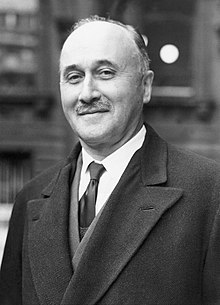
Back جان موني Arabic جان مونى ARZ Жан Манэ Byelorussian Жан Моне Bulgarian Jean Monnet Breton Jean Monnet BS Jean Monnet Catalan Jean Monnet Czech Jean Monnet Welsh Jean Monnet Danish
Jean Monnet | |
|---|---|
 Monnet in 1952 | |
| President of the High Authority of the European Coal and Steel Community | |
| In office 10 August 1952 – 3 June 1955 | |
| Preceded by | Office created |
| Succeeded by | René Mayer |
| Commissioner of the French Plan Commission | |
| In office 3 January 1946 – 11 September 1952 | |
| Preceded by | Office created |
| Succeeded by | Étienne Hirsch |
| Deputy Secretary-General of the League of Nations | |
| In office 10 June 1919 – 31 January 1923 | |
| Preceded by | Office created |
| Succeeded by | Joseph Avenol |
| Personal details | |
| Born | Jean Omer Marie Gabriel Monnet 9 November 1888 Cognac, Charente, France |
| Died | 16 March 1979 (aged 90) Houjarray, Bazoches-sur-Guyonne, France |
| Resting place | Panthéon, Paris, France 48°50′46″N 2°20′45″E / 48.84611°N 2.34583°E |
| Spouse |
Silvia de Bondini (m. 1934) |
| Profession | Négociant, diplomat, public administrator |
Jean Omer Marie Gabriel Monnet (French: [ʒɑ̃ mɔnɛ]; 9 November 1888 – 16 March 1979) was a French civil servant, entrepreneur, diplomat, financier, and administrator.[1] An influential supporter of European unity, he is considered one of the founding fathers of the European Union.
Jean Monnet has been called "The Father of Europe" by those who see his innovative and pioneering efforts in the 1950s as the key to establishing the European Coal and Steel Community, the predecessor of today's European Union.[2] Although Monnet was never elected to public office, he worked behind the scenes of American and European governments as a well-connected "pragmatic internationalist".[3]
For three decades, Jean Monnet and Charles de Gaulle had a multifaceted relationship, at some times cooperative and at other times distrustful, from a first encounter in London during the Battle of France in mid-June 1940 until De Gaulle's death in November 1970. Monnet and De Gaulle have been referred to together as "probably the two most outstanding Frenchmen of the 20th century".[4][a]
Jean Monnet was the first-ever individual to be designated as an Honorary Citizen of Europe in 1976. On the hundredth anniversary of his birth in 1988, his native country of France honoured Monnet's memory by transferring his mortal remains to the Panthéon in Paris.
- ^ Alden Whitman, "Jean Monnet, 90, Architect of European Unity, Dies", New York Times, 17 March 1979
- ^ "Jean Monnet: Father of Europe - Sturm College of Law". www.law.du.edu. Archived from the original on 18 October 2015. Retrieved 17 June 2017.
- ^ Times obituary
- ^ a b Cite error: The named reference
Casa2003was invoked but never defined (see the help page).
Cite error: There are <ref group=lower-alpha> tags or {{efn}} templates on this page, but the references will not show without a {{reflist|group=lower-alpha}} template or {{notelist}} template (see the help page).